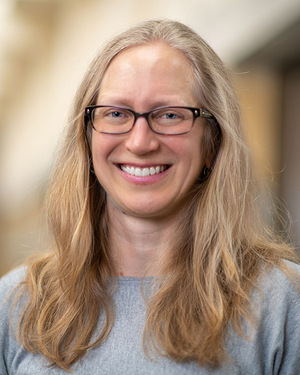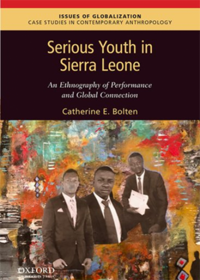
- University of Notre Dame
- Associate Professor of Anthropology and Peace Studies
- Residential Fellow (2016-2017)
- "Unknowing the World: Humans, Chimpanzees, and Climate Change in Sierra Leone"
- Faculty Fellow (2023-2024)
- “Taking Youth Seriously: Moral Panics and Young Men in Sierra Leone”
Cat Bolten is Associate Professor of Anthropology and Peace Studies at the University of Notre Dame. She specializes in the anthropology of development, particularly with respect to massive upheaval such as that produced by war, pandemics, and generational social change. Her research project, “Unknowing the World: Humans, Chimpanzees, and Climate Change in Sierra Leone,” explores the problems that climate change and environmental degradation in the tropical forests of Sierra Leone create for people and chimpanzees, whose generational knowledge is failing to sustain a liveable everyday. Considering the crises and changes that both species have adapted to for millennia—from slavery to colonial land policies, to the introduction of new plants and trees, to the birth and death of villages in the forest—this project interrogates how identity and survival of both species are affected by the failure of the rains, the decimation of cropland, the advance of invasive grass and the rise in wildfires, and the rising competition between humans and wildlife because of the novel “unknowing” of the world that climate change produces.
Bolten is the author of I Did It to Save My Life: Love and Survival in Sierra Leone (University of California Press, 2012) and Serious Youth in Sierra Leone: An Ethnography of Performance and Global Connection (Oxford University Press, 2020), and co-editor of a special issue on Ebola for Anthropological Quarterly. She has published over a dozen articles in journals such as American Anthropologist, African Studies Review, Economic Anthropology, and The Journal of Human Rights. She is also associate editor for the journal African Conflict and Peacebuilding Review and a member of the editorial collective for Studies in Comparative International Development.
Bolten's research has been supported by the US Fulbright Commission, the United States Institute of Peace, the Notre Dame Institute for Advanced Studies (2017), USAID, and the National Endowment for the Humanities.
Publications
-
Serious Youth in Sierra Leone: An Ethnography of Performance and Global Connection
Oxford University Press, 2019

Generational anxieties over what will happen to the young are unfolding starkly in Sierra Leone, where the civil war that raged between 1991 and 2002–characterized by the extreme youthfulness of the rebel movement–triggered mass fear of that generation being “lost.” Even now, fifteen years later, “children of the war” are regarded with suspicion. These fears stem largely from young people’s easy embrace of globalization, enabled by the flood of international humanitarian aid following the war. Sierra Leone’s increasingly global connectivity has triggered a cultural arms race between adults and their children, with adults often controlling, manipulating, and quashing the ambitions of the young.
Through an investigation of the lives and struggles of Sierra Leonean youth in the northern capital town of Makeni, Serious Youth in Sierra Leone: An Ethnography of Performance and Global Connection turns these fears on their head. Author Catherine Bolten argues that urban youth in Makeni are largely a conservative social force, rather than rebellious or revolutionary–the young want to have steady incomes, start families, and be respected. Adults misrecognize their children’s conservative values and desires as radical because they interpret global engagement as a desire for social upheaval, rather than as a way to be noticed and taken seriously. Bolten articulates the social processes that lead to children–the future of a society–becoming a representation of a society’s deepest anxieties about the destruction of its values and ideologies, and why those might be falsely construed.